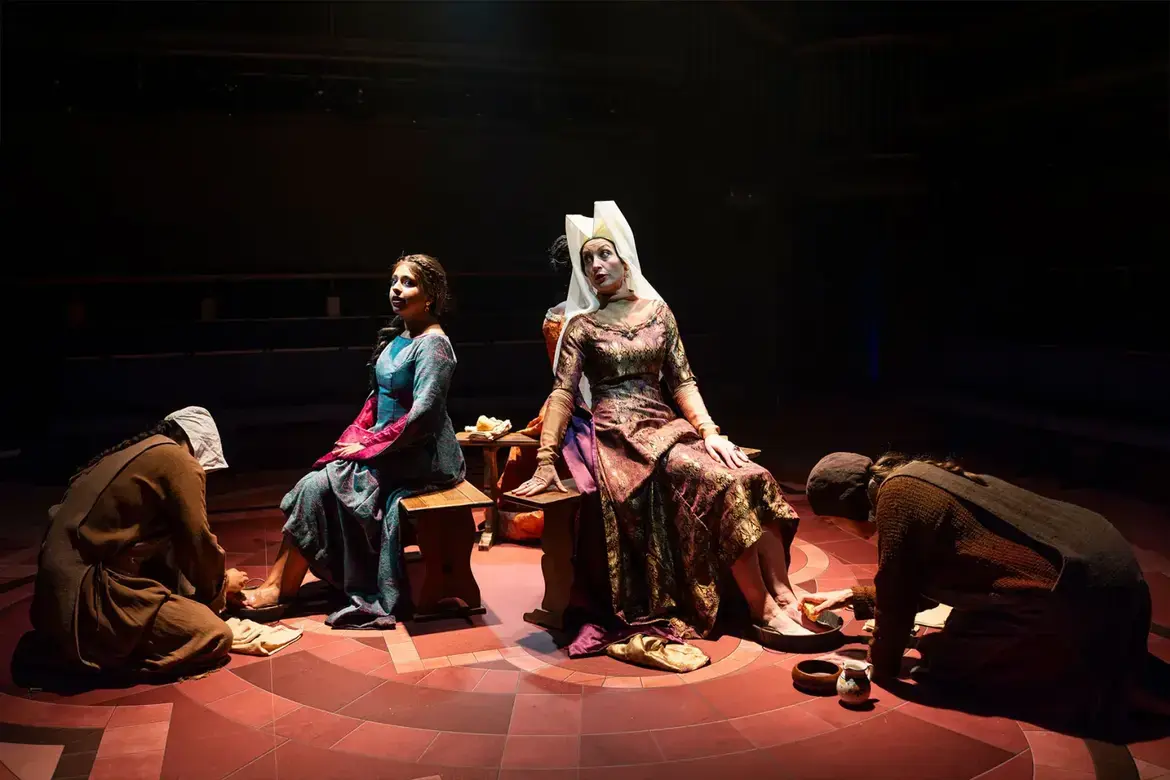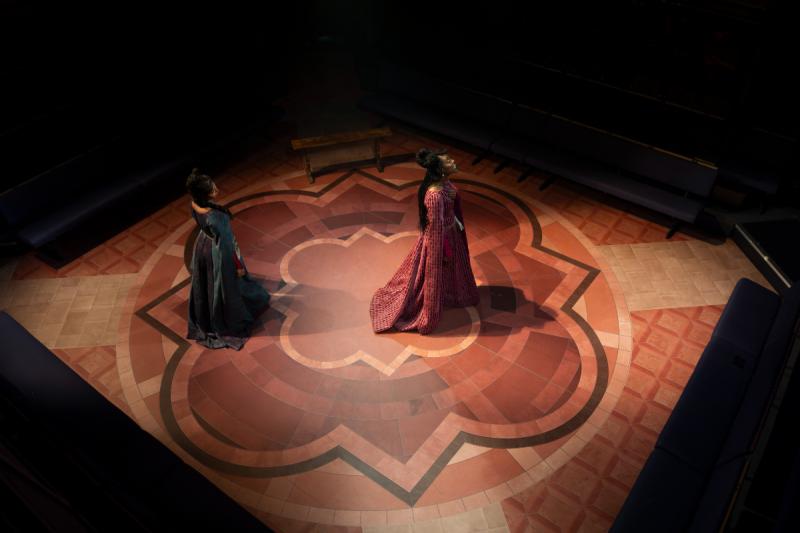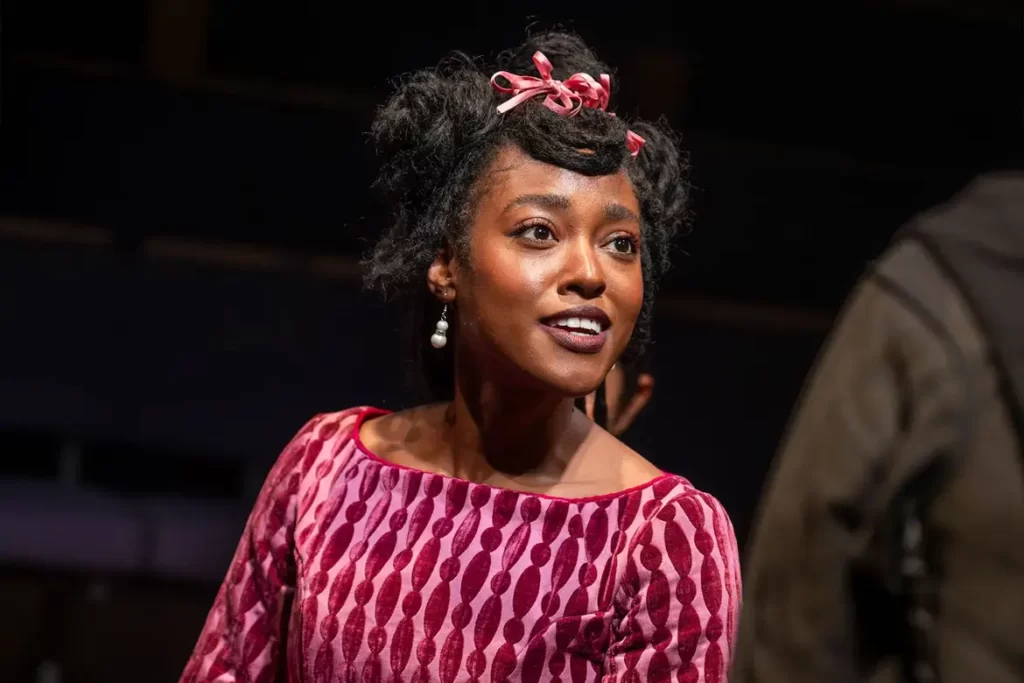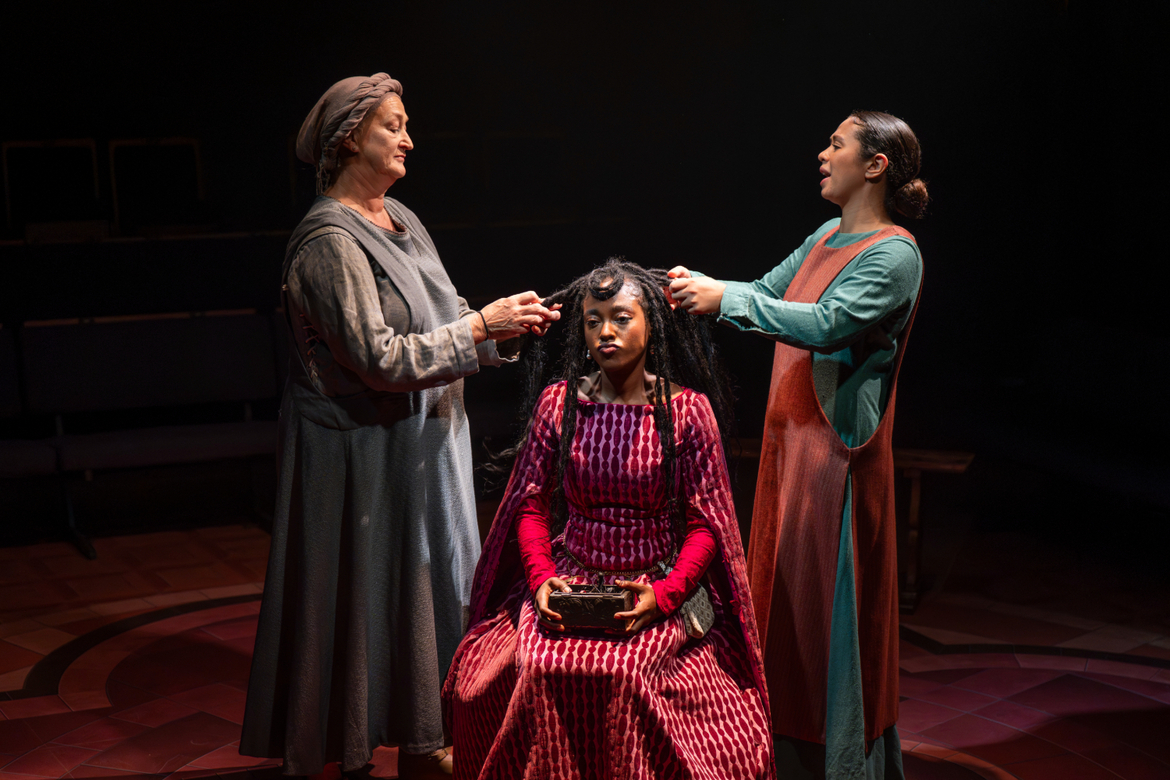Review by Simon Jenner, July 18 2025
“I’m still going to like, do charity, probably even more than I do now.” It might be 1211 in Assisi, but it could almost be 2011 in Wall Street. Especially the language. The welcome spectre of the Occupy movement haunts this tale of how future Saint Clare was inspired by future Saint Francis (aka the Birdman of Assisi) to renounce her cute+wealth lifestyle and embrace total poverty and charity. Chiara Atik’s 2020 play Poor Clare enjoys its UK premiere at Richmond’s Orange Tree directed by Blanche McIntyre till August 9th.

Liz Kettle, Anushka Chakravarti, Hermione Gulliford and Jacoba Williams. Photo Credit: Ellie Kurttz.
Poor Clare comes with a clutch of prizes and – more importantly really – was a finalist in the Susan Smith Blackburn awards for Anglophone women dramatists: a guarantee of quality. In welcome blasts of dialectical materialism, we’re treated to a work set in period dress and mores, skirted with pietistic codes and religious belief. Atik’s not ahistorical, and she counters that cod-middle English is as alien to Umbrian as 21st century New York. And this is very New York. Atik’s right of course, and Italian has changed far less than the different Englishes out there. And it’s specifically New York, not transposed to UK. Everyone in the cast speaks with an East Coast accent.
Arsema Thomas, star of Netflix’s hit Bridgerton spin-off Queen Charlotte, makes more than an assured stage debut: she illumines all corners of this production like a radiance born of stained glass. Indeed there’s lancets of light in Oliver Fenwick’s design, either tightly-focused as at one startling moment at the end, or diffused. George Dennis’s sound discreetly hums: it’s a relatively quiet production. Eleanor Bull’s set is a thing of inlaid-pattern floor and a versatile use of benches, morphing into a bed or a church long abandoned to a few firewood pews. Bull’s costumes are sumptuously in-period and there should be some award too for Chris Smyth’s wigs and hair supervision. Thomas’ hair, both its dazzling adornment (though not its partial shearing) is realised with mesmerising zeal by maids Peppa (an indulgently amused Liz Kettle), and the younger Alma (Jacoba Williams, desperate to accept a gift but class-conflicted) who in themselves filter town goss and banter.
That’s alongside Clare’s sassy-cute sister Beatrice (in Anushka Chakravarti’s cheerful fashionista), who’d be an influencer if she had the tech; and mother Ortolana (Hermione Gulliford. Gulliford arrives late, but beyond poise and social advancement confesses in a fine scene her own brush with poverty in the Holy Land, and her visceral reaction to plenty again. In reality both Ortolana and Clare’s sister Catarino joined Clare in her voluntary order. Atik rightly clears this away to focus on Clare’s growing absorption into the life of the young man she meets. Not the much older one she’s meant to marry. Most of these parts are deftly if slightly underwritten. A seven-strong cast here seems a luxury a UK writer mightn’t dare. Or am I going all hairshirt?
Thomas dominates, alongside Freddy Carter as Francis. He’s impossibly preppy-pretty, even with the tonsure which Clare rightly suggests is a bit horrible (there’s a delicious moment when he suggests he might reduce it. No better declares Clare). The language Francis uses is pure Marxian anti-capitalism and Carter runs with this ina mix of button-holing and boyish appeal.
His Francis never hectors, his rage somehow gentles throughout just as Clare’s radicalised. ”To have any amount of wealth! Means that you are on some level okay with people having less than you do.. … You have nice clothes because someone made them for less money than what you paid. You eat food because someone out there is tilling the land…” Atik and Francis don’t need to add starvation-labourers at Amazon, or what must be the sublimated Primark motto: ‘we work them harder so you don’t have to’.

Photo Credit: Ellie Kurttz.
Clare’s fascinated, then anxious to help, then as she realises this isn’t enough, elects to join Francis. That brings challenges to Francis when he’s actually confronted with what he’s asked for. Their affinity’s gradual intimacy is adroitly handled. Class and period sexual custom suggest a former wealthy man of 30 and an unchaperoned and richer girl of 18 shouldn’t even be talking; but it happened. It seems this Francis, despite mutual warmth, is chaste not predatory. Though intimacy hovers, whatever there might be is delicately sublimated in a single tender moment. With a switchover point and mild crisis as Clare pushes back the very words he’s used when Francis realises he’s creating a poor Clare: “Because if you’re not part of the blight you’re causing it?”
Atik’s re-imagining is a compelling reminder of how poverty exists as long as we allow it to. It’s underscored by a swirl of extra cloth and a very Occupy encampment and some contemporary beggars: “Can you spare any change, please?” says one who Clare and Beatrice take for a coil of rubbish. It might seem too much but Atik brings on several. Another an ex-serviceman briefly depicts Umbrian wars: when you consider desperate ex-Iraq and Afghanistan soldiers skirting Occupy tents, it’s no stretch. George Ormerod inhabits gratitude or incredulity as a Beggar; but as The Poor he’s altogether more challenging, emboldened to push Clare to consider what’s really needed.
Thomas in a final sepulchrally-lit scene morphs to now in her references, as you’d expect. Atik might have kept in period and let the resonances speak but the punch is undeniable, and in the play’s framing, necessary. Now robed in Clare’s future Thomas speaks from Clare’s past. Atik and Thomas try, in a sequence of litanic repetitions, to grasp the transcendant with a snatch of vision. Atik hasn’t quite got the great phrase, but it might well be authentic in its stark simplicity. Its 100 minutes ever seems too long and a few more unravellins might have been welcome. Sassy yet profound, probing yet exuberant, it asks all of us: No, don’t look at me. Look at you. A quiet must-see this summer.
Assistant Director Esther Fernández Guerra, Costume Supervisor Isobel Pellow, Casting Director Annelie Powell CDG, Wigs and Hair Supervisor Chris Smyth, Design Mentee Jennifer Wright
Production Manager Pam Nichol, CSM Jade Gooch, DSM Jill Standish, ASM Phoebe Butcher, Satge Management Intern Amelia Mehta
Production & Technical Director Phil Bell, Production Technician Andy Owen Cook, Production Technician Priya Virdee.
Arsema Thomas. Photo Credit: Ellie Kurttz.



